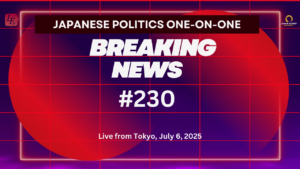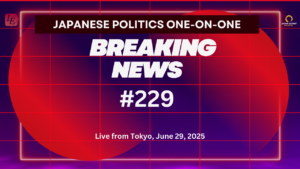Welcome to the Synopsis of “Japanese Politics One-on-One” Episode #182 produced and delivered to you by Langley Esquire and Japan Expert Insights.
Even in the middle of summer, if you gain insight from these briefings, consider a tailored one for your Executive Team or for passing-through-Tokyo heavyweights.
Meanwhile, here are the events in Japanese politics that happened just THIS week!
- The Japanese yen closed at $/¥146.6 yen, showing significant strengthening over a period of just one month.
- Japan and the Philippines held their first-ever joint exercise in the South China Sea, one week after having their first-ever joint exercises right here in Tokyo Bay
- Sado Island has been designated as a UNESCO World Heritage Site. The island is known for its gold mines. It was recognized after negotiations that included concessions related to the historical treatment of Korean laborers during WWII. This is a pretty big deal.
- The Prime Minister spent the week in Tokyo and had dinners with key figures, including Deputy Prime Minister Taro Aso and Minister of Finance Shunichi Suzuki.
- The Dow Jones Industrial Average and the Nikkei index experienced a significant drop, falling 15% in three weeks. The one-day decline yesterday is the largest since 1987 and is the result of market reactions to recent economic policies. Brace for more tomorrow.
- The Bank of Japan increased short-term interest rates and announced a reduction in long-term bond purchases, reflecting new policies under Governor Kazuo Ueda.
So, let’s dive deeper and see what-else transpired during this dramatic week:
LDP Presidential Elections Now Less Than 2 Months Away
Political dynamics are intensifying as the election for the president of the Liberal Democratic Party (LDP) approaches, set for the end of September.
Key Points:
- The Election Committee’s Primary tasks: The committee’s primary tasks officially begin on the 20th of this month. They include determining how the president will be elected. The committee will set the timing and decide on the election’s duration, which typically spans 10 to 12 days. The process becomes more complex with the increasing number of potential candidates.
- The Election Process: Election Day (9/20?) begins with a first round between the (4 to 10?) candidates, followed by a runoff between the top two candidates, ultimately determining the LDP president / Prime Minister.
- Potential Candidates: Although no candidates have officially declared their intentions yet, the likely contenders are as follows:
- Prime Minister Fumio Kisihida
- LDP Secretary General Toshimitsu Motegi
- Digital Minister Taro Kono
- Ishiba Shigeru
- Sanae Takaichi
- Shinjiro Koizumi
Upcoming Discussions:
- Securing 20 endorsers is crucial for any candidate to enter the race. The LDP’s membership, consisting of 366 members in both Houses, makes the endorsement process highly strategic. Endorsers can only support one candidate, and aligning with a losing candidate could diminish one’s political standing.
- Announcements from candidates are expected after the Obon festival in late August, leading into early September.
Stay tuned for updates as we approach these pivotal dates.
Upcoming LDP and CDP Leadership Elections to Potentially Overlap
An intriguing aspect of the upcoming LDP election is its potential overlap with the Constitutional Democratic Party’s (CDP) own leadership election.
Key Points:
- History doomed to repeat? This scenario echoes a similar clash from three years ago when the CDP’s election campaign overlapped with the LDP’s, resulting in media focusing predominantly on the LDP race. This overshadowing significantly impacted the CDP, leading to long-term repercussions and in fact a change in leadership from Yukio Edano to Kenta Izumi!
- Options for the CDP: Determined to avoid a repeat of history, the CDP plans to conduct its election within a narrow time frame in September. This might coincide with the LDP’s campaign which is set to start around the 20th. This tight schedule leaves the CDP with limited days to run their campaign without overlapping with the LDP’s. This could again result in diminished attention. Some say this is being carefully concocted within the LDP.
- Potential Contenders: Further complicating matters is the re-emergence of Edano. After losing the leadership position to Izumi, he is now vying for leadership once more. Izumi has announced his intention to continue as party leader. Meanwhile Edano, bolstered by significant support, including from the influential Ichiro Ozawa, aims to reclaim his position.
LDP Faces Turmoil After Resignation of Megumi Hirose
The LDP has experienced a significant shift with the resignation of one of its members, Megumi Hirose, representing Iwate Prefecture in the Lower House.
Key points:
- What happened? Hirose had been billing the government for her Diet secretary, a position meant to be filled by a working individual. However, it soon became clear that her husband, listed as the Diet secretary, was receiving the salary without actually performing the duties required by the role.
- The fallout: The public prosecutor’s office caught wind of this and eventually launched an investigation, which garnered substantial media attention, leading to her resignation. This incident is a considerable blow to the LDP, as it highlights an attempt by Hirose to divert government funds for personal gain by creating a no-show job.
- Hirose is no stranger to controversy: Previously, she made headlines for being photographed exiting a love hotel with a Canadian musician. This incident, coupled with her current scandal, paints a picture of a politician embroiled in repeated controversies.
Japan and the Philippines Quickly Move Agreement to Action
Recently, Japan and the Philippines reached a significant agreement concerning reciprocal rights for stationing troops in each other’s countries. This type of reciprocal arrangement is not new for Japan. The country already has similar agreements with Australia, Britain, and the United States. However, the addition of the Philippines marks a notable expansion of Japan’s strategic partnerships in the region.
Key Points:
- Sino-Russian provocation: Last week, Russian and Chinese bombers approached Canadian and U.S. airspace in a show of collaboration, marking the first observed instance of these advanced Chinese bombers in action.
- Japan’s response: In response Japan and the Philippines quickly moved from agreement to action, conducting joint exercises just two weeks after signing their reciprocal rights agreement. These exercises, involving the Japanese Coast Guard and their Philippine counterparts, took place in Chiba just outside Tokyo Bay. This weekend Japanese forces are in Manila and the South China Sea near the Spratly Islands. There they are engaging in further joint exercises.
Yen Strengthens Sharply as The Nikkei Falls
The yen has seen a remarkable strengthening over the past 7 weeks. It is recovering from a low of $/¥162 to around $/¥146. This movement can be characterized as astounding.
- Sharp decline in the Nikkei Index: This currency strengthening has been accompanied by a sharp decline in the Nikkei Index, which has fallen by 15% from its peak just five weeks ago. This downturn marks the largest fall since 1987, following the infamous Black Monday in the US.
- If the U.S. sneezes, Japan catches a cold: The decline in the Nikkei is partly attributed to reaction in the US market. This is partly a result of concerns over the exaggerated promises of AI advancements and its impact on the market. The interconnection between the US and Japanese markets is a well-known phenomenon, with differences in trading hours accounting for a slight time lag. Monday and Tuesday will be particularly active for market watchers.
Motegi’s Strategic Absence: A Double-Edged Sword?
Toshimitsu Motegi, Secretary General of the LDP, has been notably absent from Japan over the past week. While Prime Minister Fumio Kishida was busy with a flurry of high-profile meetings—including the “two-plus-two” military and business discussions—Motegi was overseas. This absence might be strategic, as Motegi aims to bolster his image as a foreign policy expert. It just as easily could be another concoction to sideline him from the main action here in town.
Key points:
- Motegi’s Movement: Despite not officially declaring his candidacy for Prime Minister, Motegi is subtly signaling his intentions. He played a crucial role in negotiating trade agreements with the Trump Administration. He is positioning himself as the ideal candidate for Prime Minister in the event of a Trump presidency. His recent travels to Southeast Asia showcase his diplomatic skills and reinforce his credentials on the international stage.
- Stuck between a rock and a hard place: Motegi’s current role as Secretary General, where traditional Japanese political norms dictate that high-ranking officials within the Prime Minister’s Cabinet refrain from openly campaigning or criticizing their superiors. This presents a delicate situation for him: if he resigns to run for Prime Minister and fails, he risks political isolation. For Motegi, maintaining his position while subtly positioning himself for a future bid is a tightrope walk.
Upcoming Discussions
- In the coming year, Japan will face two crucial national elections: for the Upper House and the Lower House.
- A new Prime Minister could invigorate the party and potentially lead to a general election. This will offer a chance for the LDP to refresh its image and gain popular support.
- However, there is concern that regardless of leadership changes, the LDP might face a tough battle in the elections. This might happen because of ongoing scandals and public dissatisfaction.
- The CDP and Nippon Ishin no Kai (Ishin) are both working to reestablish themselves. The CDP aiming to recover from past setbacks and Ishin striving to become the leading opposition party.
July 2024: Hottest Month in Japan’s Recorded History
July 2024 has been the hottest month in Japan’s history, surpassing even last July, which was the second hottest. This record-setting heat reflects a significant trend, as July and August are typically the hottest months in Japan. According to the meteorological agency, this extreme heat will persist not only through August but also into October. This prolonged period of high temperatures will likely continue to impact daily life and environmental conditions in Japan.
Questions from The Audience Answered Exclusively During The Briefing
- The CDP is also having its presidential election in September with two candidates at the moment. Who do you think has a better chance of winning the seat?
- We haven’t heard anything from former CDP leader Yoshihiko Noda yet. Do you think he might enter the race as a candidate for his party’s presidency?
- It seems that people in Japan are more excited about the Paris Olympics than the September LDP election. Meanwhile in the US, the focus is on the November presidential election. Why is there this difference?
- I think introducing an internet voting system could be beneficial. What are your thoughts on this?
Are you familiar with “Tokyo on Fire”? Episodes are available on YouTube “Langley Esquire”: excruciatingly-gained insights sifted over 40 years in-country! Entertainingly presented.
“Japanese Politics One-on-One” episodes are on YouTube “Japan Expert Insights”.
Our goal for producing these briefings is to make you better informed and better prepared to turn everyday challenges in Japan into lifetime opportunities. Tune-in every week to do that AND to keep ahead of the constantly swirling curve!
To learn more about the complexities of advocacy and lobbying in Japan, read this article.
Join the Success!
Experience exceptional, personalized solutions designed to meet your business’s specific needs. Discover how we can elevate your operations to the next level.




